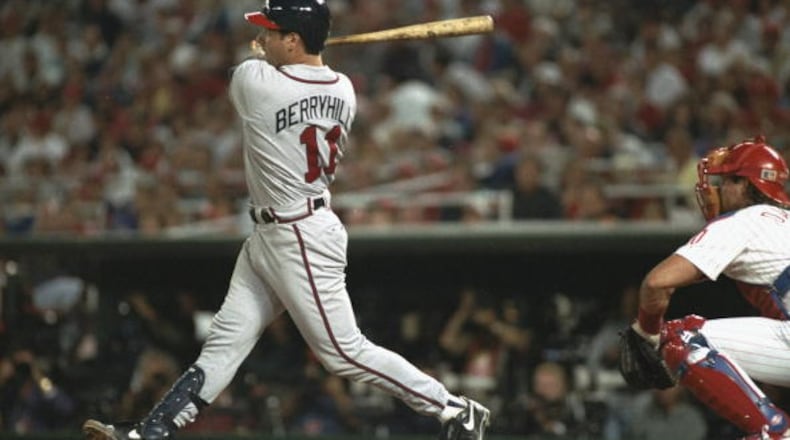Braves catcher Damon Berryhill stepped to the plate in the sixth inning of Game 1 in the 1992 World Series. Not much was expected: A .167 hitter in the postseason, Berryhill simply was subbing for the injured Greg Olson. His job was to call a good game so the Braves could pitch themselves into a championship.
But Berryhill delivered much more. He broke up a shutout with a three-run homer off Toronto starter Jack Morris. Atlanta won the game 3-1, but it was unable to capture its first title, dropping the series in six games.
Berryhill, acquired in midseason from the Cubs in 1991, played 277 games with the Braves through 1993. He bounced to Boston, Cincinnati and San Francisco before calling it a career in 1997.
Fast-forward to 2017, when Berryhill just completed his first season as manager of the Braves’ Triple-A affiliate in Gwinnett. A South Laguna, Calif., native, Berryhill previously managed in his near-hometown Dodgers’ system .
Berryhill won the Pacific Coast League’s Manager of The Year award with the Triple-A Oklahoma City Dodgers in 2015, but the organization didn’t renew his contract. He jumped at the opportunity to return to the Braves.
Similar to the Dodgers during Berryhill’s tenure, the Braves’ system is plush with talent. That made the job all the more appealing.
“Plus, coming back to the Braves,” Berryhill said. “I loved playing here, and when the opportunity opened up with Snit (Braves manager Brian Snitker) getting the job, the opportunity coming over was good for me at the time. I’m happy to be back. There’s still a lot of people here from when I was playing for the system. It’s good to see those people. I know what this organization’s about, I’ve been part of it. It’s good to get an opportunity to get back here and it’s a big plus to see the talent that they’ve gathered in the system and especially the young talent.”
Gwinnett finished 71-71, a step back from a season ago, and not nearly equal to Berryhill’s 2015 division-champion Dodgers team.
“We’ve had a young team all season and guys performed all year for us, improved,” Berryhill said. “Our young players, most of them have gotten an opportunity to play in the big leagues, and that’s our goal down here: to get those guys prepared to get up there and get their opportunity. And I think myself and the staff have done a good job preparing those kids.
“The effort these guys have put in for us all year has been outstanding. The wins aren’t really where we want them and where they could be with this club. We’ve had a lot of movement, but the effort’s been there. They worked hard to improve all year, and that’s really all you can ask.”
Berryhill’s familiarity with the organization, and specifically Snitker, has been important for a franchise trying to patrol a rebuild. Sniker turns to Berryhill often for advice on players.
For example, infielder Johan Camargo was activated from his rehab stint Tuesday, a day later than planned. After speaking with Berryhill, Snitker wanted to give Camargo another day to shake off some rust.
Snitker can relate to Berryhill. He’s spent almost half his 41-year Braves career managing in the minor leagues. Organizations often must be delicate handling prized prospects, and the Snitker-Berryhill trust aspect shouldn’t be overlooked.
“Anytime there’s a move, or we’re thinking of making a move, or just a question on how’s he coming, how’s he looking at third, or at times we’ve put people over at first, is that a possibility,” Berryhill said. “So a lot of communication on how guys are progressing and how things are going really. Just checking in and seeing what’s going on.”
This season has been particularly exciting for the organization. Not for the major-league on-field product, which has been borderline unwatchable as of late, but for the arrival of the next talent wave. Berryhill was watching Camargo, Ozzie Albies, Sean Newcomb, Lucas Sims, Luiz Gohara and others daily before they made their leap to the majors.
Berryhill’s resume includes past dealings with hyped, franchise-changing prospects. In the Dodgers’ system, he managed Corey Seager, who’s grown into arguably the best shortstop in baseball. He dealt with Joc Pederson and Scott Schebler, who have found varying degrees of success.
The Dodgers’ system was regarded as a top three, if not the best, in baseball. But Berryhill believes his current home has an even larger talent pool.
“I think the depth over here is a little deeper ... than when I was over there,” he said. “They had a good core with Seager, Peterson, Schebler, who’s now with Cincinnati, with some decent arms. Right now the Dodgers can go out and really buy what they want. But they did a good job with a few of those quality drafts. Just going depth-to-depth, youth, the talent over here is really deep and really good. It’s hard to compare right now.”
The Braves have a consensus top-two system, led by young players such as Albies, Gohara and outfielder Ronald Acuna, who Berryhill calls “special” at every mention. Coming back to the Braves was attractive enough, but having a full cupboard has made it even more rewarding.
“As far as minor-league managing, that’s what you want to do, especially at this level,” he said. “It’s rare to get an Albies, Acuna, 20, 19, even a Camargo who’s 22, I believe. To have three quarters of your team be 25 and under is kind of where you want to get as a system. Just young guys and talent to develop and hopefully get to the big leagues and have a long stint with those guys.”
Having failed to capture a title in his first stint with the team, Berryhill plays a key role in developing what the Braves hope is the foundation of their next championship run.




